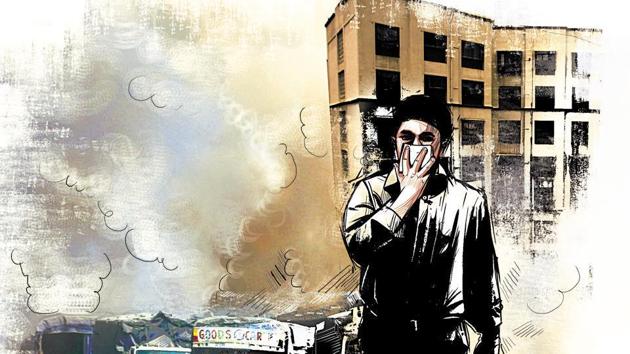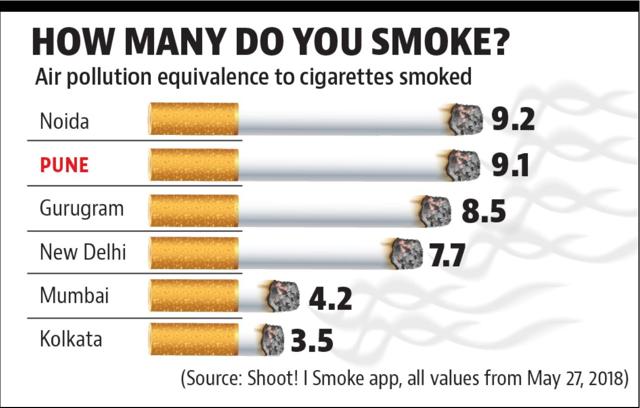Planning to take a smoke break? Just breathe in Pune’s air which equals 9.1 cigarettes a day
A new smart phone application, ‘Shoot! I Smoke’, launched in Paris last month, attempts to put in perspective just how dangerous the levels of air pollution across the world is. On Sunday, May 27, 2018, the reading on the app for Pune had the air quality on Bund Garden road as being as polluted as smoking 9.1 cigarettes.
Breathing Pune’s air is as bad as smoking nine cigarettes a day, estimates a new smartphone app that calculates real-time equivalence between air pollution and cigarette smoking. In Delhi, it’s 7.7 cigarettes while in Mumbai it’s four.


Other big Indian cities aren’t far behind, with the effect ranging between two and eight cigarettes a day.
A new smart phone application, ‘Shoot! I Smoke’, launched in Paris last month, attempts to put in perspective just how dangerous the levels of air pollution across the world is.
On Sunday, May 27, 2018, the reading on the app for Pune had the air quality on Bund Garden road as being as polluted as smoking 9.1 cigarettes.
The overall reading for Pune on Sunday was also 9.1 cigarettes. “There two factors responsible for the increasing pollution in the city, one is the increase in construction sites and the other is vehicular traffic.The pollution affects the health of human beings and physical disorders like respiratory infection, sore throat, nasal infections, asthma and allergic symptoms would increase,”said Dr Sneha Limaye, scientist at the Chest Research Foundation Pune.
The app uses location-specific data for the PM2.5 pollutant to calculate the quality of air in relation to cigarette smoke. PM2.5 is floating particulate matter that include both organic and inorganic pollutants.
Their diameter is less than 2.5 microns, which means they can enter the respiratory system easily. It uses a study by Berkeley Earth, a California-based climate science analysis to make the calculation. It’s available free on both Android and iOS platforms.
“PM2.5 particles are small enough to work their way deep into the lungs and into the bloodstream, where they can trigger heart attacks, strokes, lung cancer and asthma,” reads the study, co-authored by Richard Mueller, a physics professor at University of California, Berkeley. “Here is the rule of thumb: one cigarette a day is the rough equivalent of a PM2.5 level of 22μg/m3. Of course, unlike cigarette smoking, the pollution reaches every age group,” he added. The study, based on several others across China, found that Beijing had, on an average, a PM2.5 level of 85μg/m3 — equivalent to smoking four cigarettes.
“The air pollution in New Delhi, in winter 2017, was 547μg/m3 (for PM2.5) — the same as about 25 cigarettes a day,” Mueller said.
Officials from the Central Pollution Control Board (CPCB), however, said it was incorrect to compare cigarette smoking and the effects of air pollution. “Such studies, including a recent one by the World Health Organisation (WHO), are incorrect as they do not have a standard method of collecting data from any of the regulatory agencies, and conclude on whatever data is available, and come out with their own conclusions,” said A Sudhakar, member secretary, CPCB.
“Neither is this data updated nor validated,” he said, and added that the Union environment ministry had already issued a clarification to WHO. “It will be simultaneously issued to all other international agencies, that from now on, data sourcing should be done only from CPCB.”
The app’s developers used real-time air pollution data from the World Air Quality Index project (aqicn.org) as their main data source. The app geo-locates one’s phone through the global positioning system (GPS), and connects it to the database, which shows the number of cigarettes smoked that day.
The distance to the air quality station measuring data in Pune is cited on the app for Bund Garden road as 1km. The app developers said people were only vaguely aware of the extent of air pollution in mega cities. “Air-quality monitoring stations only provide numbers that are very specific to professionals who work on environmental issues. So, when you make this conversion to cigarettes, it makes it easier for people to understand what they are dealing with, and the consequences air quality has in their daily lives,” said Paris-born app developer Amaury Martiny, who developed the app with designer Marcelo Coelho from Brazil. He added that when users open the app, they will learn how detrimental their local air is to their health, in a quantitative way.
“The air pollution in New Delhi, in winter 2017, was 547μg/m3 (for PM2.5) — the same as about 25 cigarettes a day,” Mueller said.
Officials from the Central Pollution Control Board (CPCB), however, said it was incorrect to compare cigarette smoking and the effects of air pollution. “Such studies, including a recent one by the World Health Organisation (WHO), are incorrect as they do not have a standard method of collecting data from any of the regulatory agencies, and conclude on whatever data is available, and come out with their own conclusions,” said A Sudhakar, member secretary, CPCB.
“Neither is this data updated nor validated,” he said, and added that the Union environment ministry had already issued a clarification to WHO. “It will be simultaneously issued to all other international agencies, that from now on, data sourcing should be done only from CPCB.”
The app’s developers used real-time air pollution data from the World Air Quality Index project (aqicn.org) as their main data source. The app geo-locates one’s phone through the global positioning system (GPS), and connects it to the database, which shows the number of cigarettes smoked that day.
The distance to the air quality station measuring data in Pune is cited on the app for Bund Garden road as 1km. The app developers said people were only vaguely aware of the extent of air pollution in mega cities. “Air-quality monitoring stations only provide numbers that are very specific to professionals who work on environmental issues. So, when you make this conversion to cigarettes, it makes it easier for people to understand what they are dealing with, and the consequences air quality has in their daily lives,” said Paris-born app developer Amaury Martiny, who developed the app with designer Marcelo Coelho from Brazil. He added that when users open the app, they will learn how detrimental their local air is to their health, in a quantitative way.



